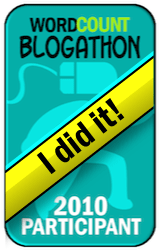
I just picked up a copy of Jenny Sanford's book, Staying True. I finished it in two days. That's how easy a read it was. It wasn't particularly enlightening, either. But it did give me a positive impression of the woman who wrote it.
Jenny Sanford, as you probably know, was married to South Carolina Governor Mark Sanford. He was the guy who claimed he'd been "hiking the Appalachian Trail" last summer, when he was really "visiting" his Argentinian girlfriend. His trip became national news because the guy had disappeared for a while, and his state department people didn't even know where he was.
From what Jenny says in her book, it wasn't the first time he'd disappeared. He'd done it before. Apparently, he'd slipped away after a business trip, flying into New York to see this same woman.
Sanford's book isn't a tell-all, so don't buy it if you're looking for hot, juicy details about what happened to the crazed governor. Instead, her book takes you through the life she made with this man, including some of the clues she missed that could have warned her of what might occur in the future. She acknowledges it's just speculation, and you can never predict the way a person will behave.
What kept her married to him all those 20 years of sometimes really bizarre behavior on his part--he left an old clunker of a vehicle for her in the airport parking garage with directions to a party on her first visit to meet his family in South Carolina; he opted to leave town when she once had surgery; he kept asking for her advice about how much detail she should tell the press after they'd discovered his affair--was her faith. She believed in love. She believed in him and their family. And most importantly, she believed in her God to show her the way.
She portrays very eloquently how she winds up losing the life she expected to be her future, how her ideal was changed by her husband's adulterous ways. She doesn't do it in a way that makes you cringe. She's very matter-of-fact and accepts her own responsibility for this marriage gone wrong. Not that she made her husband cheat on her. Women cannot do that. We just don't have that much power, unless it's criminal. But she accepts that she might have created room to allow it to happen, mostly because she didn't believe it ever would--or could--and she had become far too independent of him. Perhaps she didn't need him, as she'd learned how to live without him because he traveled so much. The contradictory truth here seems perfectly normal to me, another former wife who lived that way with her former husband.
I did not find the book particularly moving, in that it didn't delve deep into the emotion. Even during the moment when she shares how she had to reveal what dad had done to her boys does she take the story where it could have gone. Simply put: I think she did more telling than showing. But it is told nicely, and in such a way that you understand exactly how her story unfolded. And you do feel sympathy for her, and even sympathy--some--for her now ex-husband.
I must confess that I hate seeing these stories in the news. I read them, however, because it seems to me to be part of my research for the work that I do here. I also hate knowing that men can cheat so easily. I know there are women like this as well, but I am just not friends with them, and you rarely read about them, anyway. I especially hate hearing the line, "once a cheater, always a cheater." I'd like to think this is just the media promoting this view, giving these guys a bad name. But I know better. These type of men do that to themselves.
The ones who will continue to do this to themselves--and others--are those who continue denying their own responsibility. Once they start playing the blame game, I think, they are in trouble, and they've already lost.
If you've been wondering whether or not you should read Jenny Sanford's book, let me tell you I think it is her attempt to explore her marriage and the husband she had in it and why he did what he did. She couldn't. So the book ends with her accepting that his values just don't match her own. She had to let him go so he could figure out his stuff, and so she could figure out hers.
You know she will. You close the book wondering if he can do the same.












6 comments:
I must admit I have never even heard of Stanford nor his escapades over here, but thank you for the honest review.
I personally cannot believe women stay with men like that, faith or no faith.
I believe in honesty and trust and if that isn't present in a marriage, always, with no ifs or buts, then that marriage is not worth hanging around for, no matter how much you may have loved the man once.
And what lessons are you teaching your children? Not the sort of lessons I would wish mine to take into adulthood with them.
But that's just my two cents worth...
What a great review. I certainly see a connection between what is missing in her words to what was missing in her life. When anyone puts their head in the sand to just move forward with life means they are missing life and the richness of emotions that life can offer. I saw Jenny interviewed on The Daily Show. She seemed hollow there as well. Your post is more touching than her book. Thank you.
Marcia, thank you for your kind words. Did you read the book as well? Your thoughts about it?
Ulrike, what happens to many women, including me in my past, is that we ignore the warning signals. That could be for many reasons. Her book shares how many clues were present, even from the beginning, and yet she chose to see something else. It's not as uncommon as we'd like to think. Sad. But not uncommon.
I didn't read it. When she started speaking, I had hoped I would hear some great truth or important highlights from her experiences that could be shared from others. But she didn't seem to have anything meaningful to say. Your review sealed the deal for me. My book pile is too big to be reading something that would frustrate me more than enlighten me. I'd rather read your blog posts!
And yes, our brains give us the capacity to be master rationalizers. We see the clues (I don't think we miss them), but then rationalize the meaning and justify the behavior until reality becomes too big to discount. One of my favorite questions to ask myself is, "Am I just rationalizing my behavior/decision?" I force myself to declare what is true. Besides, the pain is easier to bear if we face the truth early on than if we have to face it later, right?
Marcia, I think you're right; we see the clues. But we may not recognize them for the truths that they reveal. Our minds may not let us, for whatever reason. Usually, we have to learn that lesson at the later date. Your last sentence is a great question. Maybe it should go on a Post-it note.
Yes...adding to my wonderful collection of Post-it notes!
Post a Comment